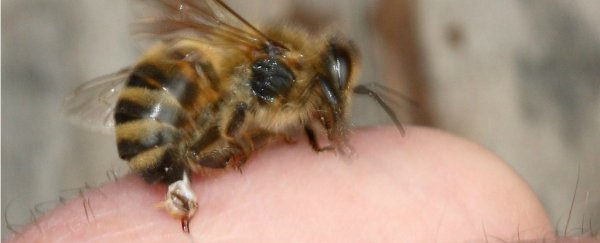A 55-year old woman in Spain has died after having an allergic reaction to live bee acupuncture, and it's yet another important reminder of how alternative therapies can be extremely dangerous.
If you don't know what live bee acupuncture is, we don't blame you - the process is kind of insane.
"We hold the bee, put it on a point on the body, hold its head, and pinch it until the sting needle emerges," bee acupuncturist Wang Menglin explained in an interview with the Australian Broadcasting Corporation back in 2013.
As all honey bees do, the imported Italian variety that Wang uses dies when it stings.
"We've treated patients with dozens of diseases, from arthritis to cancer, all with positive results," he said.
Most popular in China and Korea, the technique is spreading, despite very little evidence that it can help any of the diseases it says it cures.
The death of the 55-year old woman has been outlined in a case study by researchers Paula Vazquez-Revuelta and Ricardo Madrigal-Burgaleta from the Ramon y Cajal University Hospital in Spain, and should be used as a warning to others trying the practice.
The woman had been attending sessions of this live bee acupuncture (also called apitherapy) for two years, approximately once a month.
"She decided to receive apitherapy to improve muscular contractures and stress. She had no clinical record of any other diseases, other risk factors, [or] previous reactions of any kind," the paper explains.
"During an apitherapy session, she developed wheezing, dyspnea, and sudden loss of consciousness immediately after a live bee sting."
Although it might sound crazy that she had an allergic reaction after having the procedure so many times before, it's actually more plausible than you'd expect.
As the paper mentions, repeated exposure to an allergen - in this case, bee venom - creates a greater risk of a severe allergic reaction than what can be expected in the normal population.
The woman was rushed to hospital, and was given a number of compounds to try to stop the reaction, including adrenaline and antihistamines.
Unfortunately, despite the treatment, the patient died in hospital from multiple organ failure some weeks later.
It's really important to reiterate here that although it is growing in popularity, apitherapy shows very little evidence for being effective for any medical conditions, and this isn't even the first negative reaction to this type of therapy.
In fact, a 2015 study published in PLOS One found that "compared with normal saline injection, bee venom acupuncture showed a 261 percent increased relative risk for the occurrence of adverse events."
Plus, we really need bees doing our pollination right now, not being sacrificed for alternative medicine.
Vazquez-Revuelta and Madrigal-Burgaleta's paper sums up nicely: "the risks of undergoing apitherapy may exceed the presumed benefits, leading us to conclude that this practice is both unsafe and unadvisable."
We wholeheartedly agree.
The paper has been published in the Journal of Investigational Allergology and Clinical Immunology.
